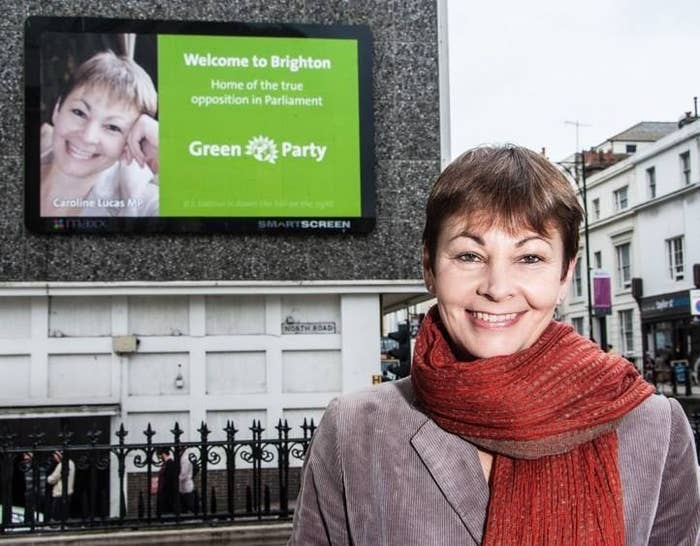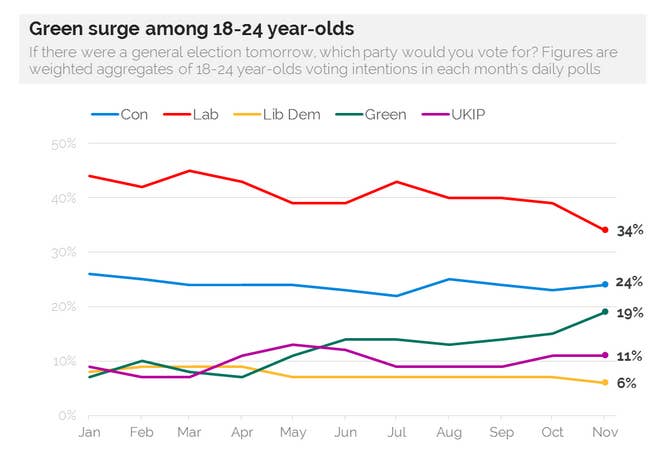
The recent surge in Green party support is being powered by students and young people abandoning Labour, according to polling company YouGov.
The Greens have been boasting of a "Green surge" across the UK, with improved polling results and a 100% rise in membership since the start of the year – they've even overtaken the Liberal Democrats in recent polls.
But, although the party is enjoying a small increase in support from all age groups, it's the backing of 18–24 year olds which is the driving force in its improved poll ratings. What's more, it's almost entirely at the expense of Labour.
"I know the party is talking about a 'green surge', but it depends how you categorise a surge," said Laurence Janta-Lipinski from YouGov. "If you're looking at the entire population it's more like a surgling, or a surgette, but there's definitely been a proper surge among the young."
Recent YouGov polling shows Green support among 18–24-year-olds has more than doubled from 7% in January to 19% in December. In the same period Labour support among the age group has fallen from 44% to 34%.

The Greens currently hold just one seat – Brighton Pavilion – but they have identified 12 more seats they think they can win in May's general election. These include Cambridge, York Central, Oxford East, and Bristol West – all constituencies with a large, young, student population.
"They're looking at places where people are well educated, have degrees: the upwardly mobile communities," said Janta-Lipinski. "The Greens are very smart. They have a very good ground game on knowing where they can win, and it's why they threw all their resources at [Brighton] in 2010."
The trend is a concern for Labour, whose young supporters are giving up on them in droves. Additionally, high numbers of disaffected Lib Dems, who now poll on just 6% among young people, had turned to the Greens long before 2014.
But it's not all good news for the Greens, who are almost entirely ignored by older members of the population.
Just 3% of people over 60s and 6% of 40-59 year-olds, intend to vote Green. Instead, they're either sticking with the Conservatives or turning to UKIP. Eighteen per cent of over-60s now intend to vote UKIP, according to the poll, with 16% of 40–59 year-olds doing the same.
The results show that the Greens are a kind of "inverse UKIP", said Janta-Lipinski, in that they are hoovering up Labour support in young metropolitan communities, whereas UKIP are winning a similar level of support in traditionally Conservative seaside towns with elderly populations "who feel left behind".
YouGov president Peter Kellner wrote:
In many ways the Greens and Ukip are mirror images of each other. Green voters are younger, more female, better-educated and more middle-class than the average – whereas Ukip voters are older, more male, more working class and far less likely to have a university degree.
Nobody knows if the Greens' rise in the polls will translate to more seats at the election. The most recent polling from Lord Ashcroft indicates the Greens will keep its Brighton seat, but even a uniform national swing of 6% towards the Green party, as the polls indicate might happen, wouldn't necessarily boost its number of seats, as it polled so lowly in 2010.
Instead of focusing on the national picture, the Greens will target a small number of young, student areas: "While they're doing much better in the polls than last time, we'll just have to wait and see," said Janta-Lipinski. "They're very bullish, but it's a tough job going from a standing start.
"Talk of them getting 12 seats is wildly ambitious but, with a concerted effort in a few seats, they could do really well. After May, there could well be several Green MPs in parliament."
